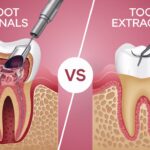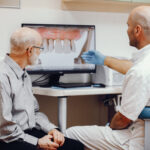Are you experiencing discomfort or pain in the back of your mouth? Have you noticed swelling or difficulty opening your jaw fully? You may be grappling with issues related to your wisdom teeth. Wisdom teeth, also known as third molars, typically emerge in the late teens or early twenties. However, they often come with a host of problems that necessitate their removal. At URBN Dental in Houston, we understand the importance of addressing wisdom tooth issues promptly to maintain your oral health. Let’s delve into the details of wisdom tooth extraction, including when it’s necessary and what you can expect.
What Are Wisdom Teeth?
Wisdom teeth are the final set of molars that typically appear between the ages of 17 and 25. While some individuals may have no issues with their wisdom teeth, many people experience complications due to their late arrival and limited space in the jaw. These complications can include impaction, crowding, misalignment, and infection. When these problems arise, removing the wisdom teeth may be the best course of action to prevent further discomfort and maintain overall oral health.Signs That Wisdom Tooth Extraction Is Necessary
Several signs indicate that you may need to have your wisdom teeth removed. These include:- Pain or discomfort: If you experience persistent pain or discomfort in the back of your mouth, it could be a sign that your wisdom teeth are causing problems.
- Swelling: Swelling around the gums in the back of your mouth may indicate infection or impaction of your wisdom teeth.
- Difficulty opening your mouth: Impacted wisdom teeth can make it difficult to open your mouth fully, leading to stiffness or limited mobility.
- Jaw stiffness: Stiffness in the jaw, especially in the morning, can be a sign of problems with your wisdom teeth.
- Repeated infections: If you experience frequent infections or inflammation around your wisdom teeth, it may be necessary to remove them to prevent further complications.
The Wisdom Tooth Extraction Process
If it’s determined that wisdom tooth extraction is necessary, your dentist or oral surgeon will begin by conducting a thorough examination of your mouth and taking X-rays to assess the position of your wisdom teeth and their impact on nearby teeth and structures. Based on this evaluation, they will develop a treatment plan tailored to your specific needs. On the day of the procedure, you’ll receive anesthesia to ensure you’re comfortable throughout the process. Your dentist or oral surgeon will then carefully extract the wisdom teeth, taking care to minimize any damage to surrounding tissue. Depending on the complexity of the extraction and your individual circumstances, the procedure may take anywhere from a few minutes to an hour or more. After the teeth are removed, your dentist or oral surgeon will provide you with instructions for post-operative care. This may include information on managing pain and swelling, avoiding certain foods, and keeping the extraction sites clean to promote healing. They may also prescribe pain medication or antibiotics if necessary.Wisdom Teeth Extraction Recovery and Aftercare
Recovery from wisdom teeth extraction typically takes a few days to a week, during which you may experience some discomfort, swelling, and minor bleeding. It’s essential to follow your dentist’s or oral surgeon’s instructions carefully to ensure a smooth recovery. This may include:- Taking prescribed pain medication: Over-the-counter pain relievers may be sufficient for managing discomfort, but your dentist may prescribe stronger medication if needed.
- Applying ice packs: Applying ice packs to the outside of your face can help reduce swelling and discomfort.
- Eating soft foods: Stick to soft foods like yogurt, mashed potatoes, and soup for the first few days after surgery to avoid irritating the extraction sites.
- Avoiding straws: Drinking through a straw can dislodge blood clots and interfere with healing, so it’s best to avoid using them for the first few days after surgery.
- Keeping the extraction sites clean: Gently rinse your mouth with saltwater several times a day to keep the extraction sites clean and promote healing.
Wisdom Teeth Removal FAQs
Do all people have wisdom teeth?
Not necessarily. While most people have wisdom teeth, some individuals may never develop them. It varies from person to person.How many wisdom teeth do we typically have?
Typically, adults have four wisdom teeth, one in each corner of the mouth. However, some individuals may have fewer or more.Why do wisdom teeth need to be removed?
Wisdom teeth often cause problems due to their late arrival and limited space in the jaw. Common issues include impaction, crowding, misalignment, and infection.What are impacted wisdom teeth?
Impacted wisdom teeth are teeth that don’t fully emerge through the gums due to obstruction by other teeth or bone. This can lead to pain, swelling, and infection.Will I be awake during wisdom teeth removal?
The procedure can be performed under local anesthesia, which numbs the area, or general anesthesia, which makes you unconscious. Your oral surgeon will discuss the best option for you based on your individual needs and preferences.How long does it take to recover from wisdom teeth removal?
Recovery time varies from person to person but typically takes a few days to a week. During this time, you may experience some discomfort, swelling, and minor bleeding.What can I eat after wisdom teeth removal?
Stick to soft foods like yogurt, mashed potatoes, and soup for the first few days after surgery to avoid irritating the extraction sites.How can I manage pain and swelling after surgery?
Applying ice packs to the outside of your face can help reduce swelling, while taking prescribed pain medication can alleviate discomfort.What should I do if I develop a dry socket?
Dry socket occurs when the blood clot that forms after extraction becomes dislodged. Contact your oral surgeon if you experience severe pain or notice an empty-looking socket.Can wisdom teeth removal prevent tooth decay and gum disease?
Yes, removing wisdom teeth can help prevent these issues, especially if the teeth are impacted or causing crowding that makes it difficult to clean surrounding teeth properly.Visit URBN Dental for Impacted Wisdom Teeth Removal
Wisdom tooth removal is a common procedure that can alleviate pain, prevent infection, and preserve your oral health. If you’re experiencing symptoms such as pain, swelling, or difficulty opening your mouth, it’s essential to consult with a dentist or oral surgeon to determine whether wisdom teeth extraction is necessary. At URBN Dental in Houston, we offer comprehensive dental care, including impacted wisdom tooth removal, to help you maintain a healthy smile. Contact us today to schedule a consultation at one of our convenient locations in Houston, including Uptown Houston, Midtown Houston, and Montrose.Sources:
Impacted wisdom teeth. (2014). Surgical techniques for the removal of mandibular wisdom teeth. (2024)URBN Dental Services in Houston, TX
Houston | Katy | Montrose | West University Place | Greater Third Ward | Greater East End | North East Houston | Houston Heights | Central Northwest | Fairbanks | Acres Home | East Houston | Southeast Houston | Central Southwest | Fort Bend Houston | Brays Oaks | Meyerland Area | Sharpstown | Alief | Westchase | Memorial | Northwest Houston | Katyland | Whispering Lakes | Pine Lakes | Woodcreek Reserve















